
Home - Search - Browse - Alphabetic Index: 0- 1- 2- 3- 4- 5- 6- 7- 8- 9
A- B- C- D- E- F- G- H- I- J- K- L- M- N- O- P- Q- R- S- T- U- V- W- X- Y- Z
STS-41-G
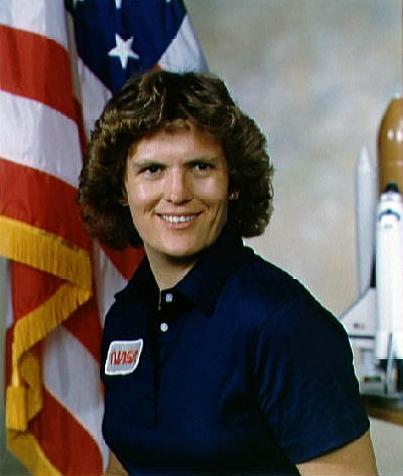
STS-41-G
Official portrait of Astronaut Kathryn D. Sullivan
Credit: NASA
AKA: Challenger;OSTA-3. Launched: 1984-10-05. Returned: 1984-10-13. Number crew: 7 . Duration: 8.22 days.
Payloads: Earth Radiation Budget Satellite (ERBS) deployment, Office of Space and Terrestrial Applications (OSTA)-3 experiments, Large Format Camera (LFC). First use of Orbital Refueling System (ORS) with extravehicular activity (EVA) astronauts, IMAX camera. The story that the Soviet Union illuminated the shuttle from the Terra-3 laser complex at Sary Shagan is comprehensively denied by the crew members and knowledgeable members of the US intelligence community.
Orbits of Earth: 132. Distance traveled: 5,527,201 km. Orbiter Liftoff Mass: 110,127 kg. Orbiter Mass at Landing: 91,744 kg. Payload to Orbit: 10,643 kg. Payload Returned: 8,398 kg. Landed at: Runway 33 at Kennedy Space Center, Florida. Landing Speed: 385 kph. Touchdown miss distance: 292 m. Landing Rollout: 3,240 m. EVA: Kathryn Sullivan and David Leestma. EVA duration 3 hours, 29 minutes.
NASA Official Mission Narrative
Mission Name: 41-G (13)
CHALLENGER (6)
Pad 39-A (25)
13th Shuttle mission
6th Flight OV-99
2nd KSC landing
Crew:
Robert L. Crippen (4), Commander
Jon A. McBride (1), Pilot
Kathryn D. Sullivan (1), Mission Specialist 1
Sally K. Ride (2), Mission Specialist 2
David C. Leestma (1), Mission Specialist 3
Marc Garneau (1), Payload Specialist 1
Paul D. Scully-Power (1), Payload Specialist 2
Milestones:
OPF - April 18, 1984
VAB - Sept. 8, 1984
PAD - Sept 13, 1984
Payload:
OSTA-3,ERBS,LFC/ORS,RME(4),TLD,APE,CANEX,IMAX-CAMERA(3)
Mission Objectives:
Launch:
October 5, 1984, 7:03:00 a.m. EDT. Launch proceeded as scheduled with no delays. Launch Weight: 242,780 lbs
Orbit:
Altitude: 218nm
Inclination: 57.0 degrees
Orbits: 133
Duration: Eight days, five hours, 23 minutes, 33 seconds.
Distance: 3,289,444 miles
Hardware:
SRB: BI-013
SRM: 012LW(HPM)
ET : 15/LWT-8
MLP : 1
SSME-1: SN-2023
SSME-2: SN-2020
SSME-3: SN-2021
Landing:
October 13, 1984, 12:26:33 p.m. EDT, Runway 33, Kennedy Space Center, Fla. Rollout distance: 10,633 feet. Rollout time: 59 seconds. Landing Weight: 202,266 lbs.
Mission Highlights:
First flight to include two women, Ride and Sullivan. Sullivan first American woman to walk in space. Earth Radiation Budget Satellite (ERBS) deployed less than nine hours into flight. Office of Space and Terrestrial Applications-3 (OSTA-3) carried three experiments in payload bay. Components of Orbital Refueling System (ORS) connected, demonstrating it is possible to refuel satellites in orbit. Other Payloads: Large Format Camera (LFC); IMAX Camera, flying for third time; package of Canadian Experiments (CANEX); Auroral Photography Experiment (APE); Radiation Monitoring Equipment (RME); Thermoluminiscent Dosimeter (TLD); and eight Get Away Specials.
More at: STS-41-G.
Family: Manned spaceflight. People: Crippen, Garneau, Leestma, McBride, Ride, Scully-Power, Sullivan. Country: USA. Spacecraft: Challenger. Projects: STS. Launch Sites: Cape Canaveral. Agency: NASA, NASA Houston. Bibliography: 4457.
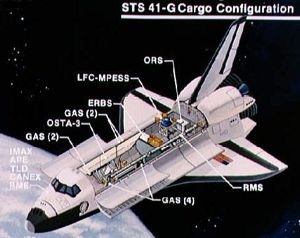 | STS-41-G Artists concept of STS 41-G cargo configuration Credit: NASA |
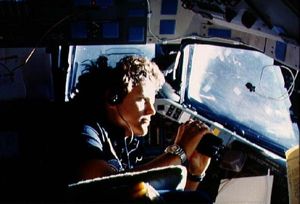 | STS-41-G Astronaut Kathryn Sullivan using binoculars for magnified viewing of earth Credit: NASA |
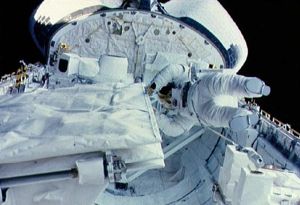 | STS-41-G Astronaut Kathryn Sullivan checks SIR-B antenna during EVA Credit: NASA |
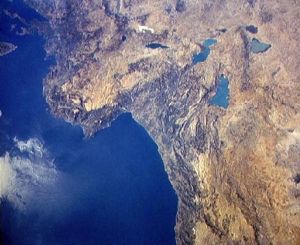 | STS-41-G Gulf of Antalya, Southern Turkish Coastline Credit: NASA |
1984 October 5 - . 11:03 GMT - . Launch Site: Cape Canaveral. Launch Complex: Cape Canaveral LC39A. Launch Platform: MLP1. LV Family: Shuttle. Launch Vehicle: Space Shuttle.
- STS-41-G - .
Call Sign: Challenger. Crew: Crippen,
Garneau,
Leestma,
McBride,
Ride,
Scully-Power,
Sullivan.
Payload: Challenger F06 / ERBS / LFC / ORS. Mass: 10,643 kg (23,463 lb). Nation: USA.
Related Persons: Crippen,
Garneau,
Leestma,
McBride,
Ride,
Scully-Power,
Sullivan.
Agency: NASA Houston.
Program: STS.
Class: Manned.
Type: Manned spaceplane. Flight: STS-41-G.
Spacecraft Bus: Shuttle.
Spacecraft: Challenger.
Duration: 8.22 days. Decay Date: 1984-10-13 . USAF Sat Cat: 15353 . COSPAR: 1984-108A. Apogee: 390 km (240 mi). Perigee: 350 km (210 mi). Inclination: 51.70 deg. Period: 92.00 min.
Manned seven crew. Deployed ERBS; performed high resolution Earth imagery. Payloads: Earth Radiation Budget Satellite (ERBS) deployment, Office of Space and Terrestrial Applications (OSTA)-3 experiments, Large Format Camera (LFC). First use of Orbital Refueling System (ORS) with extravehicular activity (EVA) astronauts, IMAX camera.
1984 October 6 - .
- STS-41-G - Wakeup Song: Flashdance - What A Feeling - . Flight: STS-41-G. "Flashdance - What A Feeling" Irene Cara.
1984 October 9 - .
- STS-41-G - Wakeup Song: Rocky - . Flight: STS-41-G. "Rocky" theme.
1984 October 11 - .
- EVA STS-41-G-1 - . Crew: Leestma, Sullivan. EVA Duration: 0.15 days. Nation: USA. Related Persons: Leestma, Sullivan. Program: STS. Class: Manned. Type: Manned spaceplane. Flight: STS-41-G. Spacecraft Bus: Shuttle. Spacecraft: Challenger. Simulated refuelling of satellite..
1984 October 11 - .
- STS-41-G - Wakeup Song: Take Me Home, Country Roads - . Flight: STS-41-G. "Take Me Home, Country Roads" John Denver .
1984 October 13 - .
- Landing of STS-41-G - . Return Crew: Crippen, Garneau, Leestma, McBride, Ride, Scully-Power, Sullivan. Nation: USA. Related Persons: Crippen, Garneau, Leestma, McBride, Ride, Scully-Power, Sullivan. Program: STS. Flight: STS-41-G. STS-41-G landed at 16:11 GMT. .
Back to top of page
Home - Search - Browse - Alphabetic Index: 0- 1- 2- 3- 4- 5- 6- 7- 8- 9
A- B- C- D- E- F- G- H- I- J- K- L- M- N- O- P- Q- R- S- T- U- V- W- X- Y- Z
© 1997-2019 Mark Wade - Contact
© / Conditions for Use